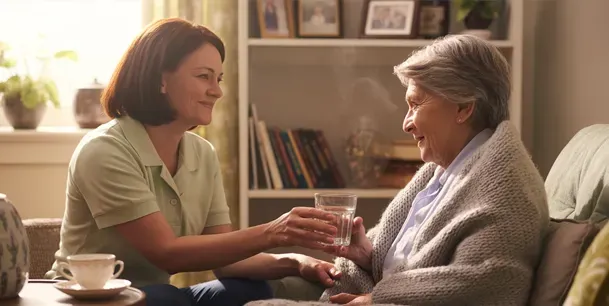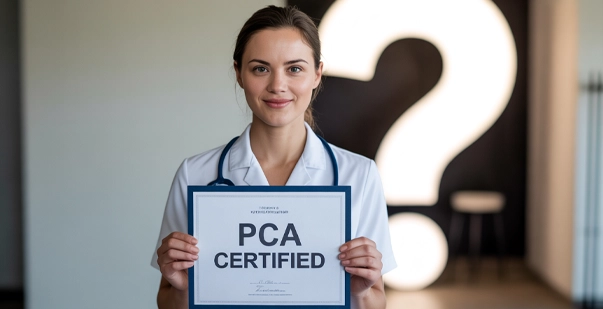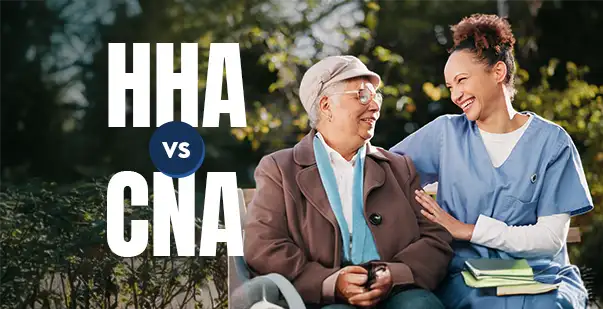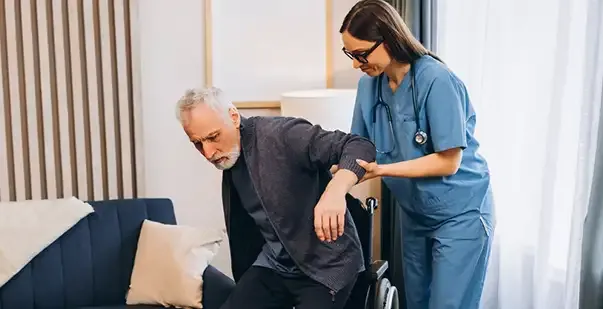Key Takeaways
A caregiver supports individuals with daily tasks, offers companionship, and assists with personal care in homes, assisted living, or healthcare settings.
Caregiver certification requirements vary: Home Care Aides (HCAs) need 5+ hours of training, Home Health Aides (HHAs) require 120 hours, and Certified Nursing Assistants (CNAs) must complete 150 hours.
To become a caregiver in California, you need to complete training, pass a background check, and register as a Home Care Aide.
What Is a Caregiver?
A caregiver supports people who need help with daily tasks, providing comfort and companionship. In California, the need for caregivers is growing rapidly. According to the Master Plan for Aging, initiated in 2019 by Governor Gavin Newsom, the state’s population of adults aged 60 and older is expected to reach 10.8 million by 2030. This makes up one-quarter of California’s total population. This shift means that more people will require care at home, in assisted living facilities, and other support settings.
People searching for what a caregiver is often want to know about training, job opportunities, and certification requirements. Training gives you the skills to handle daily care, communicate with clients, and create a safe environment. Keep reading to learn how to become a caregiver and understand the requirements in California.
Read More: Who Are Home Caregivers? All You Need To Know
How to Become a Caregiver in California?
According to the U.S. Bureau of Labor Statistics, employment of home health and personal care aides is projected to grow 21% from 2023 to 2033, which is much faster than the average growth rate for all occupations. If you're considering a caregiver course, it's important to understand how to get started on your journey in this field. The steps to become a caregiver include the following:
Step 1: Apply for Home Care Aide (HCA) Registration
You must register as a Home Care Aide with the California Department of Social Services (CDSS). You can apply online through the Guardian Applicant Portal. This process involves providing personal information and paying a registration fee.
Step 2: Pass a Background Check
All prospective caregivers must undergo a thorough background check. This process includes fingerprinting and a review of the criminal history to ensure client safety. To initiate this process, you must complete a Live Scan fingerprinting at an authorized location. The results will then be submitted to the CDSS for evaluation. A clean background is crucial for your role as a trusted caregiver.
Step 3: Complete Required Training
California requires caregivers to complete specific training to ensure they can provide quality care. This includes orientation and essential training covering basic caregiving skills, communication, and safety. Completing this training equips you with the knowledge and skills needed to assist clients effectively. Training programs are available through various approved providers, offering flexibility to fit your schedule.
Step 4: Obtain Necessary Health Clearances
As a caregiver, you must meet certain health requirements to protect yourself and your clients. This includes proof of vaccinations and a negative tuberculosis (TB) test. These health clearances ensure a safe environment for caregiving.
Read More: Top Benefits of Caregiver Certification for Your Career
Caregiver Certification Requirements and How to Qualify Them
Pursuing a caregiving career in California involves meeting specific certification requirements, particularly concerning training hours based on the type of caregiver role you choose. Here's a concise overview:
1. Home Care Aides (HCAs)
As an HCA, you need to complete 5 hours of initial training before starting your caregiving duties. This training typically covers topics such as client rights, safety protocols, and techniques for daily living assistance. After the initial training, you're also expected to undertake 5 hours of continuing education each year to stay updated with best practices and changes in caregiving standards.
2. Home Health Aides (HHAs)
For those aiming to become HHAs, the training requirements are more extensive. You're required to complete 120 hours of initial training, which includes both classroom instruction and hands-on clinical experience. This comprehensive training prepares you to provide medical-related assistance to clients in their homes. Additionally, you must complete 24 hours of continuing education annually to maintain your certification.
3. Certified Nursing Assistants (CNAs)
CNAs have rigorous training requirements, reflecting the significant role they play in patient care. You are required to complete 150 hours of initial training, which combines theoretical learning with practical skills development. This training prepares you to perform a range of duties, from basic patient care to assisting with medical procedures. To keep your certification active, you are expected to complete 48 hours of continuing education every two years, with at least 12 hours completed each year.
Read More: Caretaker Vs Caregiver - Know the Differences
What Is the Caregiver Salary in the USA?
According to the U.S. Bureau of Labor Statistics (BLS), the median annual wage for home health aides was $34,900 in 2024. Below is an overview of caregiver salaries in different cities across the country.
City | Hourly Pay |
Eugene, OR | $18.80 |
Los Angeles, CA | $18.61 |
Phoenix, AZ | $17.47 |
Milwaukee, WI | $14.69 |
Pittsburgh, PA | $14.64 |
Fort Worth, TX | $13.97 |
Dallas, TX | $13.95 |
San Antonio, TX | $13.89 |
Birmingham, AL | $13.56 |
Source: Indeed
Get Caregiver Certification Today with LearnTastic!
Many wonder what a caregiver is, and the simple answer is a professional or family member who assists with daily living activities. Becoming a caregiver allows you to make a real difference. With LearnTastic, you can start your journey toward certification with flexible, easy-to-follow courses. If you want to support older adults, assist individuals with disabilities, or work in-home care, the right caregiver training prepares you for success. Take the next step today and join a profession that offers both personal fulfillment and job opportunities.
FAQS
What is the difference between a CNA and a certified caregiver?
A Certified Nursing Assistant (CNA) provides hands-on medical care under a nurse’s supervision. They assist with tasks such as taking vitals, wound care, and patient mobility. On the other hand, a certified caregiver focuses on non-medical support, such as meal preparation, hygiene assistance, and companionship.
CNAs work in hospitals, nursing homes, and clinics, while caregivers often work in private homes or assisted living facilities. Both roles involve patient care, but CNAs have more medical responsibilities, while caregivers focus on daily living support.
Which certificate is best for a caregiver?
The best certificate depends on where you want to work and what kind of care you want to provide. A CNA certification is suited for those looking to work in hospitals or skilled nursing facilities, as it involves medical-related tasks. A caregiver certification is a good option for those who want to assist clients with daily activities in private homes or assisted living settings. Each certification leads to different job opportunities.
Can I be a caregiver without a CNA?
Yes, you can work as a caregiver without a CNA certification. Many caregiving jobs, especially in home care and assisted living, do not require CNA training. Some states or employers may ask for a caregiver certification, first aid training, or background checks. While a CNA provides more job options, you can still build a caregiving career without it. Certification requirements vary, so checking state guidelines and employer preferences can help you choose the right path.
How long do caregiver certifications last?
The validity of a caregiver certification depends on state regulations and the type of certification. Most certifications last one to two years before needing renewal. Renewal may involve continuing education, refresher courses, or updated background checks.
References:
https://www.cdss.ca.gov/inforesources/community-care/home-care-services/home-care-aide-application-process
https://www.indeed.com/career-advice/finding-a-job/how-to-become-a-caregiver-in-california?
https://www.bizinsure.com/caregiver-california-certifications
https://www.indeed.com/career/caregiver/salaries
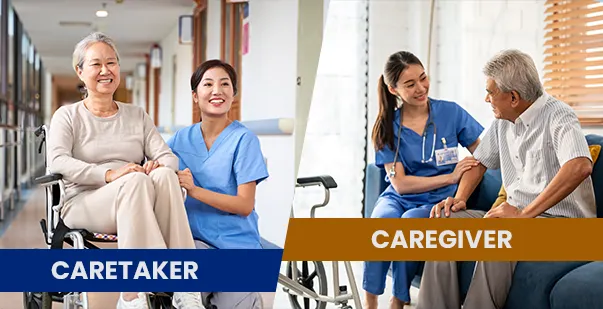
.webp)
